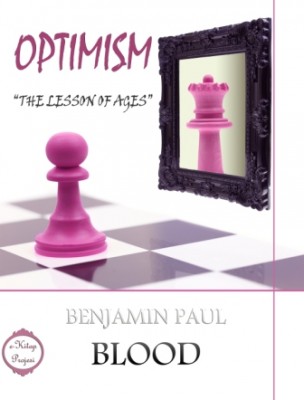More Search Results...
Benjamin Paul Blood (1832 – 1919) was an American philosopher and poet. He was born in Amsterdam, New York. His father, John Blood, was a prosperous landowner. Blood was known as an intelligent man but an unfocused one. He described himself: I was born here in Amsterdam. My father was a land holder of 700 acres [2.8 km²] here, adjoining the city on both sides of the river, and lived, as I now live, in a large brick house on the south bank of the Mohawk visible as you enter Amsterdam from the east. I was his only child, and went a good deal my own way. I ran to machinery, by fancy; patented among other devices a swathing reaper which is very successful. I was of loose and wandering ways. And was a successful gambler through the Tweed regime — made ‘bar’ls’ of money, and threw it away. I was a fancy gymnast also, and have had some heavy fights, notable one of forty minutes with Ed. Mullett, whom I left senseless.
This was mere fancy. I never lifted an angry hand against man, woman or child — all fun — for me. ….I do farming in a way, but am much idle. I have been a sort of pet of the city, and think I should be missed. In a large vote taken by one of the daily papers here a month or so ago as to who were the 12 leading citizens, I was 6th in the 12, and sole in my class. So you see, if Sparta has many a worthier son, I am still boss in the department I prefer. Blood did indeed patent a swathing reaper, along with other patents, and wrote prolifically, but the larger portion of his writing consisted of letters, either to local newspapers or to friends such as James Hutchison Stirling, Alfred Tennyson and William James (the above quote was from a letter to James). H. M. Kallen wrote of Blood: He was born in 1832 and lived for eighty-six years. During that time he wrote much, but unsystematically. His favorite form of publication was letters to newspapers, mainly local newspapers with a small circulation. These letters dealt with an astonishing diversity of subjects, from local petty politics or the tricks of spiritualist mediums to principles of industry and finance and profundities of metaphysics. Early books included The Philosophy of Justice Between God and Man (1851) and Optimism: The Lesson of Ages (1860), a Christian mystical vision of the pursuit of happiness from Blood’s distinctly American perspective. During his lifetime he was best known for his poetry, which included The Bride of the Iconoclast, Justice,and The Colonnades.
Optimism: “The Lesson of Ages”
A fancy overtakes us at times to question our presumption in writing a book. Wherein are we beter than another, that we should attempt to doctor another? We look over the matter-of-fact world and find it impossible to make a show, unless we have something to exhibit: Yet here are we who can fiddle little, and fife less-who cannot turn somersets, as we could once when we were less fit to write a book -who cannot commit by the page like an actor, nor play cbess witb a third-rate,-in short who cannot prove our ability by any standard feat whatsoever, proposing to indoctrinate many who can do all these things into the deepest mysteries of life!
More info →




























